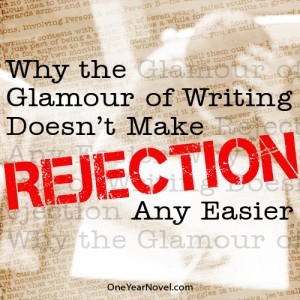Why the Glamour of Writing Doesn’t Make Rejection Any Easier
Guest post by Rachel Garner, staff
 I’m here to tell you something you probably haven’t heard before: writers aren’t special.
I’m here to tell you something you probably haven’t heard before: writers aren’t special.
They aren’t a special class of human being. They are not totally incomprehensible to the rest of humanity. Their dreams and goals are no loftier than the “boring” people interested in math and science.
I know, I know, this is a scandalous idea to those who proudly label themselves “crazy” and generally think a fashion trend towards armor and steampunk goggles is the best idea they’ve ever heard.
Stay with me here.
Let me tell you two stories.
Situation One: Entered two public writing contests with a project of seven years, failed round one in both cases.
Conclusion? Oh, that’s just part of being a writer. It takes a while for your genius to grow, and once it does, it may take a while for anyone to recognize it. Move on, keep trying.
Situation Two: Applied for 45 jobs in roughly two months. Got two interviews. A few “no”s. Lots and lots of silence.
Conclusion? Utter failure. You’re incompetent, and when you’re not, you’re still apparently not worth paying. Give up.
In case it’s not perfectly obvious, both of these people are me.
The dichotomy of my two states of mind is clear when you spell them out like I did above. But they existed in perfect mutual harmony for weeks and weeks. Until I had the fleeting thought: “Well, I guess this abysmal job search is just practice for Writing Rejection.”
(Holy music, dramatic close shot, tortured artist expression.)
No, stop it.
Writers don’t have the ultimate claim to rejection. Sure, they may have letters, allowing them to keep a (somewhat spiteful) record of exactly how many people have said no to their utterly pure and beautiful goal of writing. And being famous. And signing stuff.
But if we’re going to be melodramatic about my job search, let’s call it practice for Life.
(Melancholy music, dramatic close shot, tortured human expression.)
In all seriousness, though, there’s going to be a lot of rejection in whatever career path you take, and a writer’s isn’t any more tragic than that of the rest of humanity.
“But hold on,” you say hotly, “are these other people submitting their soul and blood in pixels and ink?”
I would hope not.
Maybe in comparison, this soul-and-blood offering seems a lot more dramatic and important than working fast food, but is it? We writers do tend to be drama queens. It’s kind of in our job. But just because it’s dramatic doesn’t mean it’s any more important.
And jobs aren’t the only thing I’m talking about here. What about the friendship that ends suddenly, without explanation? What about watching friends couple up and marry off, wondering whether He or She may ever show up? Or maybe worse, thinking they have, but finding out the person has other ideas? What about the forever that becomes divorce? What about children who drift away from you, leave your faith, or collapse under depression?
Life isn’t about rejection—thank God. But it is full of it. And my 45 job rejections aren’t practice for Writing Rejection, or, in fact, for Rejection at all. They are rejection, simple as that. The practice—the growth—is in how we respond. Past failure doesn’t always equal future failure unless we let it.
The rejection of a writer’s life comes in a very specific, tangible form. And, if we read writing industry blogs at all, we know there is no certainty that 598 rejections will necessarily mean 599.
Writers are trained to continue to fight in the industry, to believe in the importance of their story.
We need also to train ourselves to still fight forward in life, to believe in the importance of our Story. Things won’t always necessarily turn out how we expect or even how we like. But that’s life. That’s Story.
Like it or not, we share that with mathematicians and scientists and construction workers.
Our fashion sense may be cooler, but our lives are no more tortured, and our end no less glorious.
…
Thoughts? What has writing taught YOU about other areas of your life?
…
Rachel was one of the seven students—or self-labeled “guinea pigs”—who took part in the pilot class for The One Year Adventure Novel (OYAN). She placed third in both the 2008 and the 2012 OYAN novel contests. It would be hard to say who has stood to benefit more from her involvement, OYAN or Rachel! Known as “Nairam” in the extended OYAN community, Rachel is an example of dedication to her craft. She is also a kind and forthright writing mentor to students at every level of the program.
A homeschool graduate, she is now in college studying history. She hopes to become a fiction editor or help people find their inner historian by teaching history through the lens of Story. Despite claiming that writers aren’t special, she still finds writing to be the bee’s knees, especially when tinkering away at her Robin Hood retelling, Forest of Lies.
She blogs at Nairam of Sherwood »
* Please note that links on The One Year Adventure Novel Blog to other websites and blogs do not constitute an official endorsement. We are not intimately familiar with all the writing and opinions contained in outside links.




It’s so easy to defend ourselves against hurt by categorizing painful experiences as “practice” for something else. I am constantly surprised by how long it takes for me to recognize this defense mechanism at work.
Thank you for your transparency. It is so refreshing.
You’re welcome, and thank you, too, Tineke. 🙂
This… this post is much good. Thank you. I needed to hear it.
Glad to hear it. 🙂
Thank you, Rachel 🙂
You’re welcome, Adrienne! <3
Sounds like a phrase I heard once. A Dad told his daughter not to be afraid of failing, but to always “fail forward.” In other words, learn from her mistakes and use them to improve.
Good advice as always, Nai! <3
I like that phrase a lot! I hadn’t heard it before.
Well said! I enjoyed the soundtrack. 🙂
Haha, good. 😉
Rachel, this was such a fortifying piece of writing. Great encouragement and a great reminder to “take it on the chin”, and move on. Even when it’s painful. Resilience for life is being created! Thank you for sharing this wisdom.
Thanks for reading, Angie! I’m glad it’s encouraging.
Oh my goodness, it’s so rare when I read anyone saying anything like this! It’s bugged me for ages about writers thinking they’re so much more special than anyone else, and I even wrote an article a few years back on something similar: http://lauraeandrews.blogspot.com/2013/03/weve-stereotyped-ourselves.html
You have some good points in that article, too! The sadistic section especially. I always assume there’s something at least a little wrong with the way they’re approaching writing if they have that view. I think it tends to be younger authors who want to impress people.
And the hijack/imaginary friends part of characters can be exaggerated or taken to extremes, but as someone who considers herself decently sane…I think there is something in that, when you come to the right story or the right character. Sure, it doesn’t really ever leave your mind, but it can /feel/ like it does. Maybe it won’t ever happen to you, but don’t totally discount everyone who says something like that. 🙂 I think it can be part of the subconscious or something about our minds we don’t understand. Because characters definitely have said things before that I wasn’t expecting, and plots have gone places that I didn’t plan but made way more sense. Well-established authors even talk about how a character “took over” a story.
It’s just rarer, I think, than some people pretend.
Oh my gosh, so much yes. It annoys me to no end when we as writers pretend like we’re some kind of special human blessed/cursed with an overload of Byronic genius, and treat our propensity for making stories as some kind of chronic illness. Even though I’ve been guilty of that myself.
Yes, writing is hard. Writing is hard, because nothing in life is easy.
Thanks for a fantastic article!
“Writing is hard, because nothing in life is easy.”
That is probably the best way to sum up what this article was about. I’m glad you liked it.